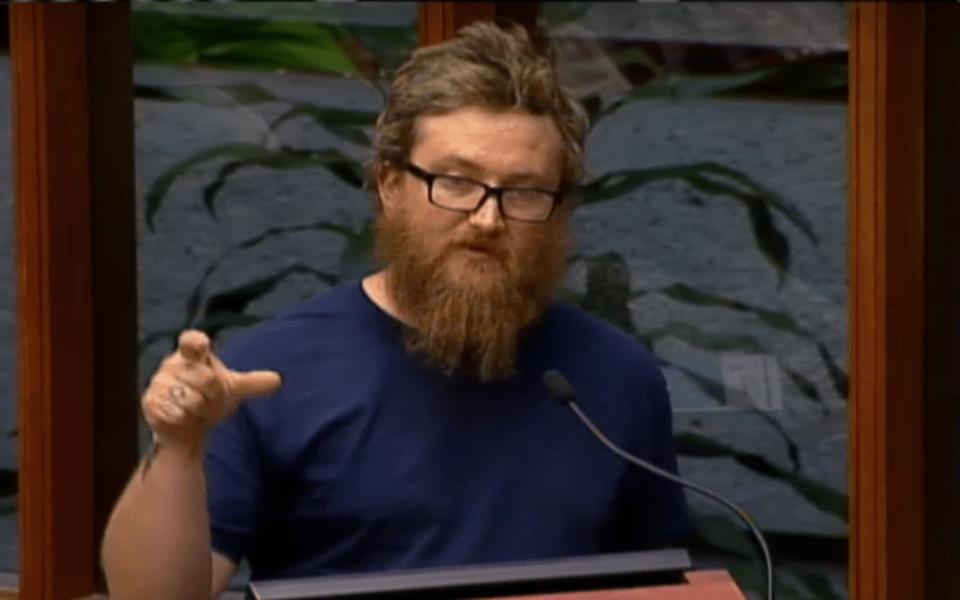The drip-drip-drip torture of delayed decision-making in local governance usually works to the advantage of government and business interests over the poor.
Elected officials are going to show up regardless; business interests are sufficiently organized and command the resources to play the long game of advocacy. The poor have to make a proportionately higher sacrifice to organize themselves and get in front of their elected officials to make their case.
But in the case of Greensboro’s suspended aggressive solicitation ordinance, the waiting game can also be seen as a function of city council’s recognition that they’re about to walk into a legal fight they can’t win. Or, if you believe Marcus Hyde, the manager of the Homeless Union of Greensboro, there’s a more sinister plan afoot.
To briefly recap, city council approved an aggressive solicitation ordinance — a “repeal and replace” action in response to an opinion that the previous ordinance was unconstitutional — in a 6-3 vote on April 24. One of the members in the majority, Councilwoman Sharon Hightower, then moved to reconsider at the next business meeting on May 15, requiring council to take a new vote on the proposed ordinance. Under the second vote, the ordinance was approved by a bare majority of 5 to 4, but legally could not go into immediate effect. City Attorney Tom Carruthers advised council members that under city code, the proposed ordinance would require a “second reading” at the next meeting on June 5. But based on “policy and custom,” Carruthers also advised that city council not take a vote at the June 5 meeting, which is a regularly scheduled “townhall” meeting. Hightower sought guidance on when the council would actually take a second vote and thus put the new ordinance into effect. Sounds like a totally reasonable question.
“I actually don’t have answer to that at this time,” Carruthers responded. “It’s yet to be determined when the second vote will come back.”
Opponents charge that the now approved but not yet enacted ordinance is, like its predecessor, a thinly veiled attempt to target panhandlers in violation of their First Amendment rights through legalese that seeks to create a façade of neutrality.
“These laws, at best, are redundant, creating new lists of laws that already exist,” Lindsey Caesar, one of the opponents, argued before council. “When someone threatens you or you fear physical harm, that is assault. We don’t need a new law for that. If someone takes your money from you against your will, that is robbery. Again, we don’t need a new law for that. We’ve covered this before. What this law really does is attempt to mask and deny poverty. It does this by using neutral language to try to hide the real purpose of this law, so the police can still target panhandling without explicitly saying so.”
Prior to the May 5 vote, several downtown restaurateurs and developers marshaled by Downtown Greensboro President Zack Matheny made the case in favor of the ordinance, mostly on economic grounds, which tied to the perception of public safety. Notably, no one argued that downtown is actually unsafe.
“Panhandling in downtown is a big problem for downtown businesses, who also struggle, maybe not to put food on the table, but to stay in business,” Andy Zimmerman said. “I think a lot of people want to go to Friendly Shopping Center because they are not confronted by panhandling. I think we lose a lot of business downtown because of panhandling.”
Hyde waved letters of concern from the ACLU and the National Law Center on Homelessness and Poverty as he stood behind the podium addressing council.
“Every aspect of this ordinance has already been stricken down by the courts,” he said. “You have been warned that if this law stays in place you will get sued and you will lose.
“Your city attorney, however, has a nasty scheme in mind: Letting you all vote 5-4 on a second vote to vote for an unconstitutional law and delaying implementation of the law while he solicits evidence as a legal defense,” Hyde continued. “He and Zack Matheny have already solicited business owners to come out and say panhandling is a safety concern.”
As a conspiracy theory, it’s not all that far-fetched. Carruthers had acknowledged that the city legal staff has consulted with Judith Wegner, a retired dean at the University of North Carolina Law School whom he lauded as “one of the leading national experts.” Wegner provided a model panhandling ordinance at a Municipal Attorneys Winter Conference that took place in Chapel Hill in 2017, at which she recommended that cities host “community dialogues designed to adduce evidence needed in developing panhandling policies.” To stay ahead of the courts, cities need to identify objectionable conduct rather than single out classes of people they don’t like.
Carruthers announced last month that the city has hired the Parker Poe law firm, which has also been retained by the city of High Point to help it craft a legal anti-picketing ordinance. Carruthers added that the hired lawyers were already in active discussions with the ACLU.
“I think that it is always more efficient to talk than litigate, but now is the time because we have an opportunity now to talk,” Carruthers said, “and I think the consensus of council as that this is a good time to begin.”
Join the First Amendment Society, a membership that goes directly to funding TCB‘s newsroom.
We believe that reporting can save the world.
The TCB First Amendment Society recognizes the vital role of a free, unfettered press with a bundling of local experiences designed to build community, and unique engagements with our newsroom that will help you understand, and shape, local journalism’s critical role in uplifting the people in our cities.
All revenue goes directly into the newsroom as reporters’ salaries and freelance commissions.


Leave a Reply